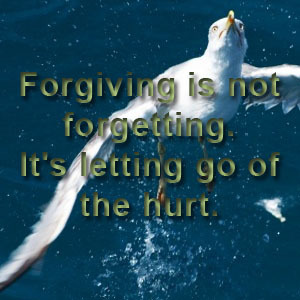Forgiving is Not Liking
The word forgiveness normally comes with a whole load of baggage. Because of its religious connotation, a lot of people think one should forgive in order to be considered righteous. This is not forgiveness. It’s pseudo-forgiveness.
When we talk about forgiving a debt or pardoning someone, we are not really forgiving them. We are just letting them off the hook.
Letting it go or trying to forget or move on is just another form of denial. It is not forgiveness. The toxic energy of the grievance remains in the body and will likely come out, in the end, as a disease.
Another assumption that attaches itself to forgiveness is that to be able to forgive them, you have to like them. That is not so in the least.
Even if you despise the person (the human being and his or her personality etc.), you can still forgive them. That’s because the process of forgiving is not about the other person. It’s about you. You do the forgiveness for you.
This happens in spite of your own very human and justifiable feelings of disdain. In the end, it comes down to whether you have the capacity to see beneath the unlikeable, despicable character manifesting in front of you and recognize the divinity in him or her.
This is not easy and that’s why we have created tools, like the Radical Acceptance of Another Worksheet, to help us shift our perception of the person so we can understand that he or she is the way he or she is because that’s exactly how he or she is meant to be.
As I wrote in my first book, Radical Forgiveness: “There are no exceptions. If you can’t forgive Hitler, you can’t really forgive anyone.”
Just as you don’t need to like them to forgive, neither do you need to stay around them if they remain emotionally or physically toxic to you. While you need to move away from them (and in Hitler’s case, wage war on him), it doesn’t stop you doing the Radical Forgiveness work on them.
Like all the worksheets, it asks that you be honest. Begin where you are and accept how you feel about the person. In other words, accept your humanness. Even if you don’t end up liking the person one bit better after having done the worksheet, the work will have been done at the energetic level anyway. You may find yourself feeling a little differently about them – neutral, perhaps, with very little energy left one way or the other.
Because the real goal of Radical Forgiveness is all about healing the illusion of separation, you might also consider the possibility that the other person is offering you the opportunity to heal that myth of separation, both within yourself, between you and him/her, and between the world of spirit and the world of humanity.
By recognizing the divinity in the other person, no matter the horrible things he or she may have done, you are connecting more deeply to the Love that is behind everything.
Blessings,
Colin
P.S. The Radical Acceptance of Another Worksheet mentioned in this blog are available in PDF form when you sign up for Free Stuff at RadicalForgiveness.com. If you have past and present relationships to heal, or want to prepare for a new one, take a look at our new Expanding in Love Online Workshop, and choose a free bonus gift for a limited time.
Colin C. Tipping's Blog
- Colin C. Tipping's profile
- 43 followers




